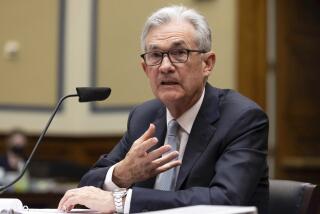Japan Undergoing a Moderate Recovery, Officials Say : Economy: Others disagree; J.P. Morgan predicts fall in investment. Value of auto sales flat.
- Share via
TOKYO — Is Japan’s worst post-World War II recession over?
In a report interpreted by the mass media here as the official word of the end of the three-year slump, the government said last week that, in essence, things are looking up.
The economy has turned “toward a moderate recovery,” the Economic Planning Agency (EPA) said in its monthly report to the Cabinet--continuing months of caution on forecasting the direction of the struggling economy.
But the EPA also warned that a “full-fledged” upswing could not be foreseen until companies’ investments in factory equipment stops declining and apprehensions over the impact of the surge in the yen disappear.
“The sun, once it rises, doesn’t reverse course, but we can’t say that about our economy,” EPA Minister Masahiko Komura said.
Tsutomu Tanaka, the agency’s vice minister, was more optimistic. He said the economy could achieve the goal of 2.4% growth that the government set in its fiscal 1994 budget.
Isamu Miyazaki, head of the Daiwa Research Institute and a former EPA vice minister, said growth would range between 1% and 1.5% this fiscal year and reach 3% in fiscal 1995, even without full recovery in corporate profits and investment. Equipment investment, he said, would turn upward in mid-1995.
But J.P. Morgan in its own report Friday predicted that investment would decline 7% this year and fall again by 0.5% next year.
The recession, by EPA calculations, began in May, 1991, in the aftermath of the bursting of a “bubble” of excessive investment in plant equipment, stocks and land in the late 1980s. Last year, growth all but halted, with gross domestic product increasing only a tenth of a percent.
The agency cited as reasons for its cautious optimism a continuing high level of housing construction, increases in production, a pickup in consumer spending spurred by a $55-billion refund to taxpayers in late June and early July and improved business confidence.
The EPA failed to mention it, but strong exports also have added a prop.
Just a week ago, however, Hideo Sakamaki, president of Nomura Securities, declared that “the future is still a black hole. Japan is still in a tunnel, and we can’t see the exit.”
Sakamaki also said that the country’s capital markets are “not functioning” to provide funds needed for growth.
Kenneth S. Courtis, strategist and senior economist for Deutsche Bank Capital Markets Asia, said banks’ bad loans, which he estimated at about $650 billion, or 8% of the banks’ assets, “represent a major negative for the entire economy.” Continued contraction of bank lending because of that debt burden, he said, “makes it, at best, problematic for the economy to expand any time soon.”
Yutaka Kume, chairman of Nissan Motors, also remained pessimistic.
“I can understand that the politicians in the government want to say that the economy has recovered, but to us in the auto industry, it just feels that we have finally hit the bottom,” he said.
Sales of trucks started increasing just last April in comparison with a year earlier, and auto sales began picking up only in July, he noted. Customers, moreover, have switched to buying smaller cars and recreation vehicles, and as a result the value of sales still has not increased, he complained.
More to Read
Inside the business of entertainment
The Wide Shot brings you news, analysis and insights on everything from streaming wars to production — and what it all means for the future.
You may occasionally receive promotional content from the Los Angeles Times.










